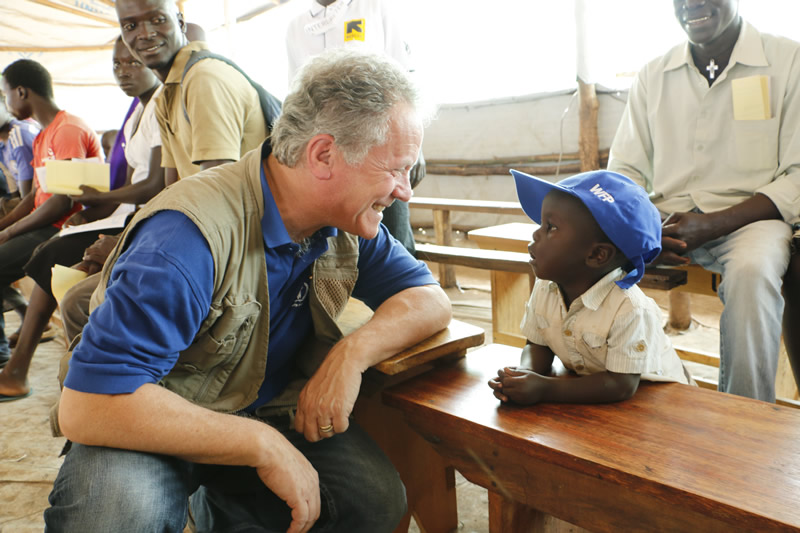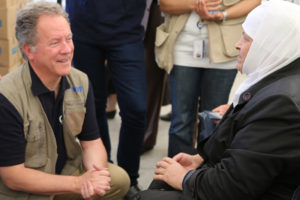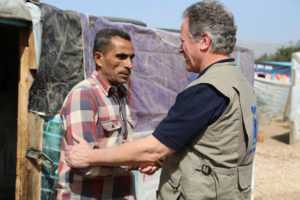
By Andy Brack, republished from the Charleston City Paper | Former South Carolina Gov. David Beasley, fresh off a battle with the coronavirus, spends his days on calls and video chats with global leaders, imploring them to continue aid for millions of hungry people in scores of struggling countries.
As executive director of the world’s leading humanitarian organization, Beasley has a lot of worries and a long prayer list. The World Food Programme feeds up to 100 million people a day in 80+ countries.
- Previous coverage: Beasley is South Carolina’s Jimmy Carter in fight against world hunger, August 2017
In particular now, he’s laser-focused on continuing the program’s aid from developed countries. If it gets cut, millions of people could die, he said Tuesday in an exclusive Skype interview from his home in Society Hill. He’s been there since a self-imposed quarantine in mid-March after contracting COVID-19. Now he’s over it, but says he is working to build back his stamina.
“If our major donor country economies collapse or deteriorate significantly and we do not receive funding for these [impoverished] areas, literally when you do the math, you see that 25 or 30 million people could die,” he said.
If funding cuts lasted six months, 150,000 people per day in poor countries could die, he estimated.
“That’s not alarmist. That’s not Chicken Little. This is what we’re facing,” Beasley said. “Hopefully, while the donor countries are taking a hit, we’ll be able to convince them not to back off emergency food support.”

Across the world, 821 million people were undernourished in 2017, two-thirds of whom lived in sub-Saharan Africa and southern Asia, according to WFP numbers.
In the best of times, the world’s hungry face immense challenges. But for those in impoverished countries, the coronavirus pandemic could worsen their plight, Beasley explained, adding the disease could easily boost the number of hungry people by 20 million.
“In fragile countries that have fragile health care systems [and] fragile economies, many of the people in these countries have weak immune systems, which means they’ll be much more vulnerable to a disease like corona and this compounds the issue we will face inside Africa.”
Beasley knows how debilitating the coronavirus can be. He felt the first symptom at home on March 13 after traveling for five weeks. Despite being tested negatively in the Middle East, he figures he must have picked up the virus at an airport or somewhere else in the U.S. or Canada after he returned for meetings.
First he had some fever, never going much higher than 101 degrees Fahrenheit. Then came some aches, pains, and what he said were typical symptoms of the flu. He thought he was getting hammered by allergies from pine pollen that bombs the state.
Out of caution, Beasley said he quarantined himself. Then came a day with no symptoms, but he went to a Pee Dee hospital to get tested, just in case. A couple of days later, the test came back positive.
Next were the draining symptoms — moderate fever, aches, pains, a little sore throat. There would be good days and not-so-good days that sapped his energy. He said he got a little concerned about some chest congestion, but that went away. He got a lot of rest, hot showers, and took vitamins and over-the-counter flu medicine.
“I haven’t had fever in 10 days and the doctor cleared me last week,” Beasley said Tuesday. “Now, I’m trying to get energy back, stamina back. It’s been over three and a half weeks now. … “It was never awful, but it’s obviously been an ordeal.”

As his strength returned, he started spending time briefing presidents and prime ministers of countries about the WFP’s plans, needs, and how it is prepositioning food, protective gear, testing kits, health supplies, and other support in impoverished places that could become disease hotspots.
More than anything, he has worried about what happens if the food and aid supply chain breaks down, as happened in the U.S. when people rushed to hoard beans, rice, and toilet paper.
“If that happens in one of the most sophisticated supply systems in the world, what do you think is going to happen in developing countries?”
Beasley, now 63, first was elected to the S.C. House of Representatives in 1978 as a college senior. The Pee Dee native rose in the Democratic Party to become the House Speaker Pro Tem, only to switch to the Republican Party in 1991. Elected governor three years later, he pushed a conservative vision of solving social problems through wealth creation. While governor, companies made more than $16 billion in capital investments in the state as property and business taxes went down by more than $1 billion.
After losing a reelection bid in 1998, Beasley focused on international outreach work thanks to the security provided by his family’s banking business in the Pee Dee. He took over as head of the WFP in April 2017.
Andy Brack, editor and publisher of Statehouse Report, also is publisher of the Charleston City Paper, which first reported this story.















 We Can Do Better, South Carolina!
We Can Do Better, South Carolina!